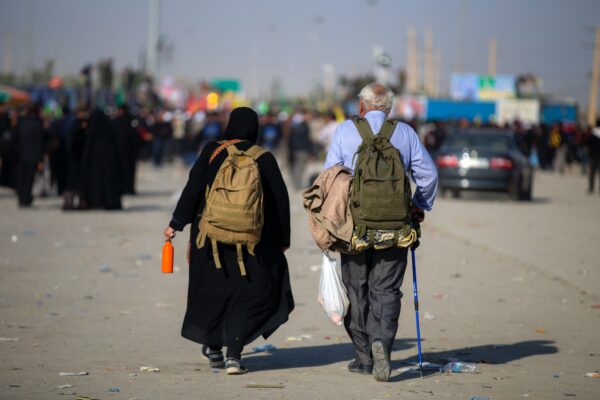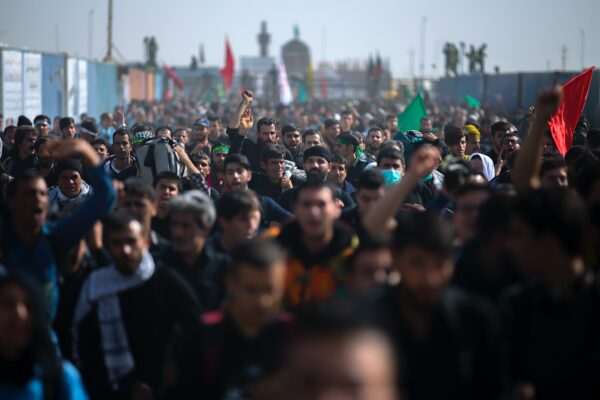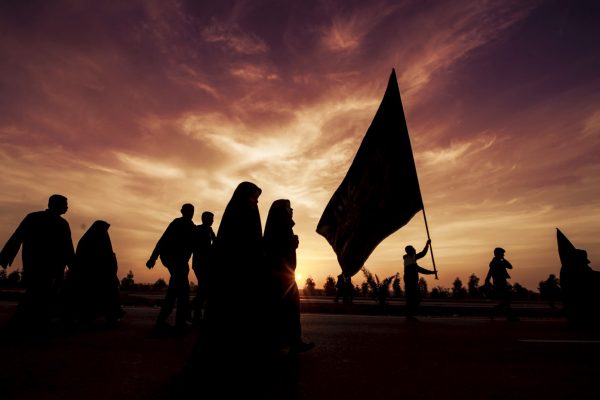Hidden beneath the golden dome of the Land of Massacres and Calamity was a great Secret that I sought to unveil. I caught snatches of this Secret being alluded to between the whisperings of the Hussaini flags as the wind ruffled them to agitation. The calligraphic letters that curled and twisted on the banners murmured amongst themselves in the silent spaces between the words they formed. Sometimes a rusted door hinge would shriek about the great enigma, but it would be quickly silenced. Other times the scraping of sandals against the pavement would hint at it, but it was in a language too foreign for me to understand.
My destination was far, but I was adamant. I decided to embark on this journey and learn for myself the mystery behind this unprecedented phenomenon. There must be a reason for this flame of passion that rose from the embers of time. This could not be a mere passing movement if it had survived the battering of millennia. There was something ethereal in voices of the travelers when they cried out the name of their beloved. Something alive, timeless, and Divine.
I shaded my eyes against the glare of the sun and looked down the road that stretched before me. Like a running brook, lovers streamed toward the golden domes. Dirt roads were now garmented with the black cloaks of the travelers. Streets and highways turned into rivers that flowed souls rather than water. Here, the Secret I sought was singing, but I could not decipher its words.

I looked down and saw an ancient stone wedged in the desert sand. Kneeling, I said to it, “O stone! Tell me of the great calamity that you once witnessed!”
It replied, “Of what shall I speak? Of the blood shed or the water deprived? Of the betrayal or the imprisonment? It was against me that the swords struck, hitting bone first then my sides. I counted the bruises and slashes on the neck that was once kissed by the Wise Prophet before I saw it raised on a lance. I felt the earth shudder beneath me as horses trampled over the body of Fatima’s beloved. The arrows that did not strike the chest of Ali’s son clashed against me. How can I recount to you a scene that has made even a stone like me shudder with despair? But no matter, I have collected my story and will recount it in truth on the day The Creator instructs me to unfold my secrets. But tell me, what have you witnessed?”
“Me?” I replied. “I am afraid I live in an age far removed from such men of nobility. We do not have people who sacrifice themselves for truth and loyalty anymore. I have seen death and carnage like you have, but for causes too vague to be truly believed in or too selfish to be honorable. There are those who sacrificed themselves on this land, but it was for greed and bloodlust, and rather than protecting lives they felled as many as they could. The word ‘sacrifice’ has been twisted on the tongue of Time and is now changed to ‘suicide.’ The values of old are gone. I see no heroism.”
“You should become a stone, then,” it replied wryly. “For my part, I witnessed the very acts of nobility and heroism you say your kind lacks. I have seen men embrace flames to keep them from spreading. I have seen women risk their lives and the lives of their children to protect strangers from those who breed flames. A few moments ago, I saw a man march past here, with an wizened old woman on his shoulders. He had been carrying her on his back for days, but he is not the hero in this case. This act is compassionate in its own right, but pales in comparison to the years his mother spent in tireless and thankless servitude to him and his siblings. No, the mother here is the one with true nobility. You frown. Were you expecting a more grandiose account?”
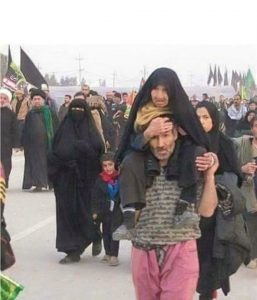
“I want to know what compelled the man to carry his mother,” I said, “or what makes mothers carry their children on such a long and tiresome journey. Why leave the comfort of their homes for something that brings neither profit nor enjoyment? They have not come for laughter or leisure; they are tired and weeping. Yet they do not complain! What is it that draws them here?”
“Ah,” the stone returned, “that is a secret. You may want to ask the flag, however. It is much taller than I and has witnessed life from a loftier angle.”
***
I found the flag hanging limply in the momentarily still air. I approached it cautiously, as I knew flags had a tendency to lash out with little warning. “O Flag!” I cried, “What have you seen from your station that I have not? What is the great Secret that turns the solid earth to mist and makes the dead rise from its depths?”
“I am but a flag on a pole,” it replied. “Fabric and motion, nothing more. But I have the memories of other flags like me. Once, on this very earth you stand on, someone carried a flag twice as tall as I in one hand. He had the mien of a nobleman with the strength of a lion. They called him ‘The Moon of the Hashemites,’ but by the winds that give me life, I have never seen a moon shine as brightly as that man’s face.”
A slight draft passed through the folds of the flag and it seemed to wince. “I see the memories of that flag as if they are my own. It felt so proud, billowing over the children of Abraham. It channeled the strength of its bearer from its rod to its tassels, but one day a merciless blow severed the rod and the hands that grasped it. A flag is not meant to sink in a pool of blood. Our station is with the winds.” The flag trembled and began to weep.
“I wish,” said I, “that there are tales of courage to speak of now. It is disheartening to think that gallantry has died with the flag bearer.”
A light gust shook the flag out of its limp dejection and it asked, “Do you not see the servants of Al-Abbas displaying the same courage as their master? The moon in the heavens does not shine but that someone calls upon The Moon in the shrine. Look there, and tell me what you see.”
Two small boys were making their way toward them in the sea of black cloaks and multicolored banners. One of them was pushing a stroller with a framed photograph of a man with the same soft green eyes they possessed.
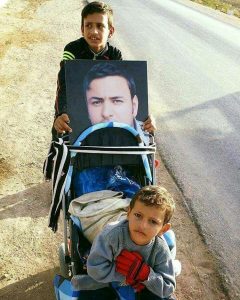
“Every year of their young lives,” said the flag gravely, “the father of these two boys took them walking to see The Moon and his master. Last year he was killed like The Moon and his master in the very same place The Greatest Calamity unraveled. The danger of death is growing, yet these two boys embarked on this journey anyway, this time taking their father with them to meet the Secret. Is that not courage?”
I watched the boys accept a cup of tea from a man who called out to them with a hoarse voice. Upon closer inspection, I realized that the man, who was pouring tea from a heavy tea kettle blackened with soot, did not have hands.
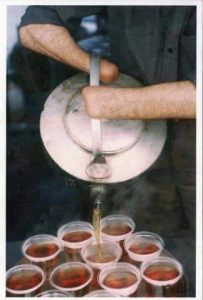
“Go to the river,” the flag instructed. “It is calling for you.”
***
I approached the Euphrates river with clenched teeth and tears in my eyes. Before I could speak, it cried, “Do not blame me!”
“You denied them water,” I said bitterly. “How could you?”
“Do not blame me!” it sobbed. “If I could, I would have flown to the children of Ishmael. It is not I who denied them but the enemies of God!”
“How many paragons have died parched at your banks? Like flower buds, they withered in the sun, while you watched. Do you dare feign innocence? Al-Abbas cupped your waters in his hands!”
“He did not want to drink!” shrilled the Euphrates. “With devotion I brought forth the clearest of my waters but he threw it from his hands as if it scalded him! ‘How could I drink,’ he said, ‘while my brother Hussain is parched?’ No amount of cool water could have enticed him to quench his thirst, had I been the Fountain of Kawthar itself!”
“If only we had such examples of loyalty and selflessness!” I cried despairingly. “Our world would not be as dismal as it is now!”
“Do you truly think your kind lacks selflessness? Every day since this journey began I hear the servants of Al-Hussain call out to the travelers and hail them like royalty. I see them cry with joy when a group of travelers agree to rest in their homes. They feed them from an abundant table spread which they do not partake in and cover them lovingly while their own children sleep without blankets. These are people who struggle to eat two meals a day, yet they provide a bountiful feast for strangers from savings they have collected patiently throughout the whole year. All day I hear the visitors of Aba Abdillah being greeted with calls of welcome and brotherhood. I see little children with tattered clothes extend their small hands not to beg, but to beseech the travelers to drink water or take the warm sandwiches their parents carefully wrapped. No selflessness? No generosity? I am a river with no eyes and ears yet I see and hear more than you!”
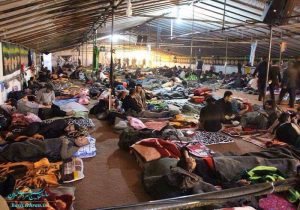
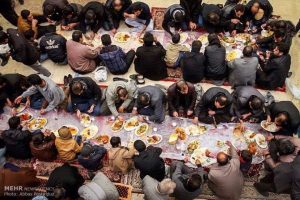

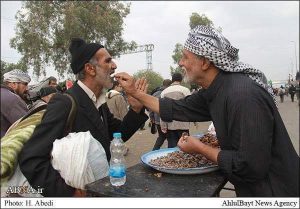
I bowed my head with shame. “Could you,” I asked tremulously, “Could you tell me the secret behind such generosity? Where does this passion come from?”
“It is not for me to say,” the Euphrates replied shortly, “but I hear the door over there shriek about it from time to time. Perhaps you should ask it.”
***
I followed the river’s directions and came to a heavy wooden door with old, peeling paint at the front entrance of a masjid. Orange rust coated its hinges like moss on tree bark. Passersby pushed it aside as they walked through the doorway and it screeched dreadfully.
“Ya Hussain!” it wailed.
“O door! What do you know of the great Secret?” I called out after its voice died down. “What can you tell me of sadness?”
“Sadness? Doors do not feel sadness… but we witness it every day. In every house and every room there is sadness. We merely keep it hidden.”
A passing breeze eased the door shut and it began to groan. “I see you looking at the nail. Yes there is a nail protruding from my back. Does that remind you of another door?”
I nodded, feeling my eyes tingle. The door continued with a moan, “The Mother of Sadness knows the weight of such doors as I, and the piercing pain of such nails. But she never once wept for her own woes. She wept for her father, the Mercy to All Worlds, who died and left her world. She wept for her husband, the Prince of the Believers, who bled from his crown for three days before joining her and her father in the afterlife. She wept for her eldest son Al-Hassan, who would one day taste his own blood mixed with poison. She wept for his brother Al-Hussain, who watched his family being slaughtered before his eyes after three days of being deprived of food and water; who died the most merciless death, knowing that the widows and the orphans he was meant to protect would be imprisoned by his killers. She wept for her daughter Zainab, who addressed her family’s murderer in his court with strength reminiscent of her father’s, but broke down into tears of despair when Hussain’s youngest daughter died in her cell. Fatima wept, because her unborn child Mohsin, who is also familiar with the sharpness of a door nail, could have grown up to be the supporter of Hussain when Hussain called for helpers, or the guardian of Zainab when she cried for her father. Fatima still weeps, in fact, at every commemoration upheld for her children.”
“Do…” I began, but I knew the answer already.
“Yes?”
“Do people nowadays weep for others like Fatima did?”
“Look behind you.”
I turned, and saw a procession of mourners approaching. Every face was contorted with grief and painted with tears. Some mourners beat their chests with their fists while sobbing “Ya Zahra,” while others covered their faces and wailed “Ya Hussain.” One man stood at the head of this procession and recited poetry in a low, sorrowful voice broken by suppressed sobs. It was not long before I joined the procession, and let my tears flow to the sound of the rhythmic lamentation.
“The secret is at the shrines!” the door called after me.
***
Night descended upon the travelers but they did not cease their trek nor slow down. It nestled in the black cloaks the women wore over their heads when the dawn rose from the sands and lifted its youthful face towards the sky. It lingered over the small ripples in the cups of tea being distributed to the devotees. Night, it seemed, did not want to leave any more than the travelers did.

Our destination was approaching. As the body slagged and protested being taxed beyond its endurance, the spirit danced and sung with boisterous rapture. Soon, our hopes will manifest in the shape of a golden dome and the two minarets on either side.
I saw it just as I looked up from an elderly couple supporting each other in their walk. It gleamed with paradisiacal light and seemed to beckon to me. “O dome!,” I cried, feeling hot tears spilling onto my cheeks. “What is the Secret? Speak to me of love!”
It did not speak; it did not need to. I saw the answer to my question pressing in around me from all sides. Fathers lifted their daughters above their heads so that the little girls would be the first to see their beloved. Mothers held their sons close so that the boys always had a canopy of security over them. Young women hooked arms with their husbands and old men pushed their elderly wives on wheelchairs. It was with love that every visitor to the shrine cried out the Imam’s name. It was love that softened their touch as they passed a hand over the doors of the entryway. Love blessed the kisses they planted on the bars of the dharih and bloomed onto the green fabric they wiped over it. Love brought them to recite salutations and read aloud the text of the ziyara with voices trembling from the weight of tears. Love radiated; beamed, more brilliantly than the glittering chandeliers surrounded by the tiny panes of reflective glass that threw back the light in all directions.
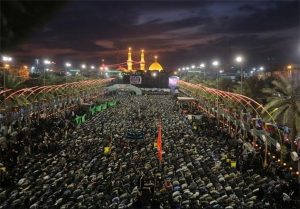
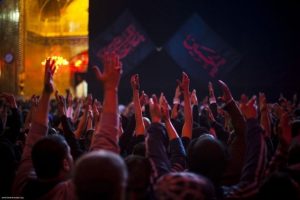
I turned around, weeping openly, and saw the gleaming dome of Al-Abbas’ shrine. “O dome! I cried again. “What is the great secret that moves us so?”
The dome, with its two minarets in front of it like hands pointing upwards, seemed to gesture at the sky. I looked up at the azure firmament unblemished by a single cloud and sobbed. In its blue depths I saw, fleetingly, what looked like five human figures gathered under a cloak. In one motion they raised their hands in prayer and I followed their gaze and looked ever further into the heavens.
The light in the depth of blue shone with the Light of God. It was then that I understood. I had been looking without when I should have been looking within. With a fervent prayer, I searched my heart and there, glowing like a lamp in an olive tree, was the Secret:
The immeasurable, insurmountable love the Most Loving has for Ahlul Bait surges through His creation, so that stone, flag, river, door, dome, man, woman, child, animal, angel, and jinn all cry, with love bordering on insanity, “Ya Hussain!”
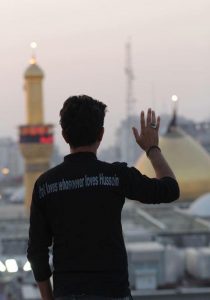
Dedicated to my dear (and new!) friend Sukaynah Weiskopf
